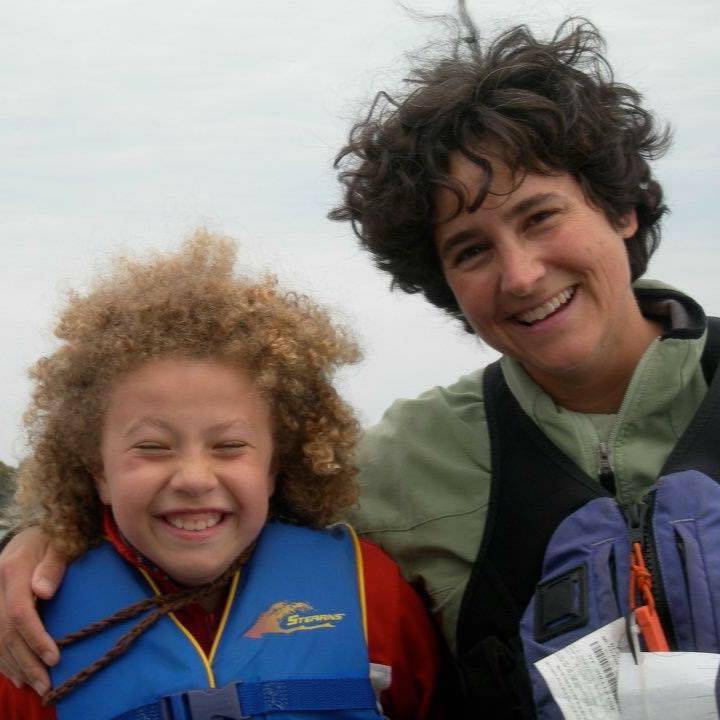by Trillium Swanson
Funhouse Commons Mentor Program Coordinator
Mentoring changes the lives of both mentor and mentee.
After more than 10 years of mentoring on Orcas Island, Suzanne Olson reflects upon the impact that holding this role has had on her, and the power of mentoring for young people. Since 2006, Olson has watched her mentee, Adia Dolan, grow through childhood, adolescence and into young adulthood. Dolan was seven when they first started meeting up, and now, at 19, she has a lifelong friend and ally in Olson.
While today the two no longer meet up weekly, they have the foundation of a relationship that means, as Olson puts it, that “if she needed me, we’re totally right there.”
Olson explains: “She’s an extraordinary person, so in witnessing her life, I feel like mine has so much richness added. Not just the big events like her theater work and her sports prowess, her singing and music — just her energy in my life.”
Looking back over the early days of their relationship, Olson shares that “she got me back into my more creative mode. For her it was just natural. She was just doing what she did as a child.”
Olson says the role of mentor means a commitment to following the child’s lead: “I hadn’t drawn since I was a kid, or maybe a little with my kids — but she loved to draw when we’d watch movies, so we’d get out the art materials and we’d draw.”
As Dolan grew, this commitment remained the same.
“She came into a time of life where she needed some different things, personal growth as a teenager, a safe place, and again, I kind of followed her lead to figure out what was needed here, and what was comfortable for me,” Olson said.
She is clear that quality, individual attention from caring adults is a critical ingredient in rooting a young person’s self-esteem.
“Every human being needs to be witnessed in order to feel whole, and this is an opportunity to give kids that experience,” Olson said. “And to have an adult … be present to witness that part of your life, even if it’s just one chapter, gives a lot of value. It gives kids a lot of grounding, it lets them feel seen, and a sense of value in the world.”
Mentors provide a unique chance for kids to get this recognition. This resource can greatly enrich the future of a young person, no matter what kind of home life they come from.
“Think about how many times you’re out in public and you see kids and families, and the kids are going ‘Hey hey hey! look at me!’ – there are so many competing priorities – especially with families that are working,” Olson said. “Parents are so divided in their attention. They’ve got multiple kids, they’ve got cell phones, they’ve got multiple things going on. It’s such a gift that when you are with [your mentee]—and you know, it can just be an hour a week – they get your undivided attention.”
And that time spent together doesn’t need to be practicing a particular skill or making sure that child is on track at school. According to Olson, “Even if all it is you’re doing is sitting in the park and picking grass. Whatever it is, they have your undivided attention, and that is a supreme gift.”
This kind of positive mentoring relationship has ripples that influence a child’s worldview in deep and lasting ways.
“I’ll tell you what happens,” Olson explained. “When they get it early, they seek it out. A kid who has a mentor when they’re seven and feels what it’s like to be seen and have their undivided attention will ask for help from a teacher in school, they’ll connect with a coach, they’ll look for a mentor in their vocation or avocation, because they’ve learned that it is a satisfying and effective way of getting what you need.”
What Olson has personally experienced to be true is reflected in the studied outcomes of structured mentoring relationships. Students who meet regularly with their mentors are 52 percent less likely than their peers to skip a day of school and 37 percent less likely to skip a class, according to a 1995 comparison study of 950 children, conducted by an independent Philadelphia-based national research organization called Public/Private Ventures.
Mentoring teaches children, early on, that people are there for them. In school, this means that children with mentors are more resilient to challenges, and more likely to utilize the resources they need to keep showing up when things get tough.
And while mentoring makes a difference in a child’s life, Olson said, “I get so much out of it. [Adia] brought me back into song, and creativity and playfulness, and … frankly, she witnesses my life in ways that just blow me away.”
For more information about The Funhouse Mentor Program, visit www.funhousecommons.org, email volunteer@thefunhouse.org or call 360-376-7177.



